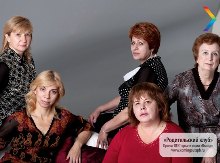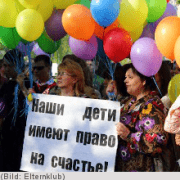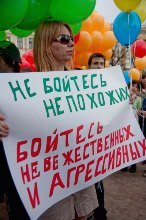Commitment that gives courage: the parents' club in St. Petersburg has been supporting Russian LGBTs and their mothers and fathers with advice and support since 2011. Sascha Gurinova spoke to Nina Sozaeva, co-founder and mother of LGBT activist Valeri Sozaev.

How did the parents' club come about?
In October 2010, the 3rd International LGBT Film Festival "Side by Side" was held in St. Petersburg, where the film "Prayers for Bobby" was shown. This was followed by a discussion on the coming out of homosexuals, bisexuals and transsexuals in their families, in which mothers also took part.
Finally, the presenter talked about LGBT parents in the USA, the UK and Israel who have come together to support their children. It was interesting for us to learn what an important role parents play in efforts to promote acceptance of LGBT people in the family, but also in society. As a result, we spontaneously decided to set up a parents' group in St Petersburg too. Now the parents' club is one of the projects of the LGBT organisation "Coming Out", where we have been meeting every third Monday of the month since January 2011.
What exactly should the parents' club do?
We originally intended to work with other LGBT parents to support them on the path to acceptance of their children. Now, however, we are more interested in helping LGBT people themselves and showing them how to prepare parents for coming out, how to communicate with them afterwards and what developmental steps parents need to go through. Of course, we also address the acceptance of one's own sexual orientation or gender identity and the reduction of fear and insecurity.

How many people are currently involved in the parents' club?
Unfortunately, working with parents is more difficult because there are many LGBT people living in St. Petersburg who have moved here from other regions of Russia. We then try to communicate with their parents via the internet. We only have a few LGBT parents who live in St. Petersburg. Many of the local parents say they accept their children and therefore don't need our help. However, we know from our own experience how much they need to talk to other mums and dads about their experiences, fears and hopes.
What are the most common challenges faced by the parents' club?
From time to time, LGBT people report that their parents wanted to force them into treatment, and we have also had cases where people no longer dared to go home after coming out. It is much more common for parents not to accept that their children are "different" and no longer want to talk to them, at least not about this topic. We could help all these parents, but unfortunately only a few find their way to us.
However, there are also parents who are against the parents' club. It is almost impossible to talk to them because they are more interested in public opinion than the happiness of their own children. We have not yet found a way to approach these people.

What successes have you already achieved?
Thanks to the parents' club, some parents have already managed to talk openly about their children's sexual orientation or gender identity with friends or relatives - and sometimes they even discuss it with homophobic people. The parents' club has also helped us to overcome our own fears, understand our children better and be more self-confident.
Then there are parents who have managed to accept their children for who they are, but can't talk to anyone else about it. Not everyone has the strength and courage to come to the parents' club and share their problems. Sometimes even LGBT people don't realise that their parents need information, support and an exchange with "like-minded people" just as much as they do.
Is the parents' club also internationally networked?
Yes, we have contacts with parents in other countries, primarily Moldova and Ukraine, and we benefit greatly from this. Our only meeting with non-Russian-speaking parents so far was in 2013, when we were guests of "Proud Parents" in Sweden. We received a lot of emotional support there. Thousands of people greeted us at the Pride Parade - an unforgettable experience that still inspires our work today.
Why is international networking so important to you?
We would love to meet up with more mums and dads from other countries, especially parents who have been active for longer. Hearing from them how to get a more open-minded society or how to approach coming out to parents or how to deal with questions like "What did I do wrong?" - these would all be important topics for us. I don't see any differences between the problems of parents in Russia and parents in other countries: They all worry about their children's well-being in the same way.
What do you want for the future?
We parents dream of a world without homophobia and transphobia, a world where hate has no place and diversity is accepted: Only in such a society can people be happy. And parents only want their children to be happy.
I hope that LGBT people and their parents in Germany will continue to be committed to recognising diversity and HIV prevention. We are inspired by them because we know how difficult it was for them to build a new society after the Second World War. Their example gives us hope that we in Russia can also renew society.









